Have you ever had a childhood home dream that left you feeling perplexed? Have you ever felt like there was something more to it, something hidden that you couldn’t quite put your finger on? If so, you aren’t alone. Many people have similar dreams that seem to have a deeper meaning they can’t quite grasp. But what if there was a way to uncover the hidden meaning behind these childhood home dreams? By exploring the symbolism, emotions, and memories associated with the dream, you can begin to uncover the hidden meaning beneath the surface.
Types of Childhood Home Dreams
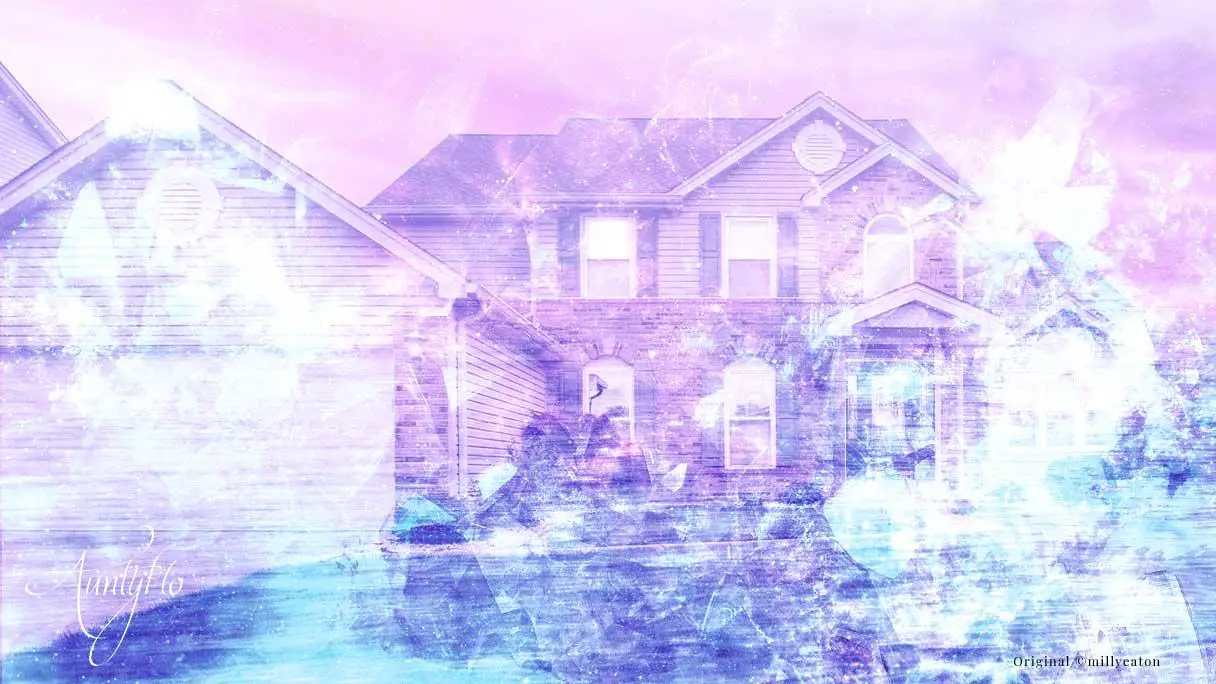
| Type | Description |
|---|---|
| Family Dream | Dreams of a family home filled with love, warmth, and security. |
| Fantasy Dream | Dreams of a home that is magical and filled with wonder. |
| Adventure Dream | Dreams of a home that is full of adventure and exploration. |
| Creative Dream | Dreams of a home that encourages creativity. |
| Mystical Dream | Dreams of a home that is filled with mystery and intrigue. |
| Green Dream | Dreams of a home that is sustainable and environmentally friendly. |
| Innovative Dream | Dreams of a home that is technologically advanced and cutting-edge. |
Childhood home dreams can be divided into various types. Family dreams are the most common and involve a home filled with love, warmth, and security. Fantasy dreams involve a home that is magical and filled with wonder. Adventure dreams are about a home that is full of adventure and exploration. Creative dreams involve a home that encourages creativity. Mystical dreams are about a home that is filled with mystery and intrigue. Green dreams are about a sustainable and environmentally friendly home. Innovative dreams are about a technologically advanced and cutting-edge home.
Dreaming of a Current Home

| Pros | Cons |
|---|---|
| The dream of having a current home can easily be realized if one has the financial means to buy or build a home. | Buying or building a home can be expensive and, depending on the location, the cost of living may be high. |
| Living in a current home allows one to feel more secure and comfortable as they have full control over the home. | Moving into a current home can be stressful and there may be a period of adjustment as one gets used to the new space. |
| A current home can provide one with more privacy and space, as well as more opportunities for personal growth and development. | Owning a home can be a large financial commitment, and it may require ongoing maintenance and upkeep. |
Having a current home is a dream for many, as it offers the chance to create a space of one’s own. A current home provides more freedom to customize the space according to one’s tastes and preferences. Furthermore, it allows one to be in control of their home and the surrounding environment. On the other hand, the costs associated with buying or building a home can be prohibitive, and the cost of living in the chosen location may be high. Additionally, moving into a current home can be stressful, as there may be a period of adjustment as one gets used to the new space. Ultimately, the decision to pursue a dream of having a current home should be weighed carefully, as it requires a long-term financial commitment and ongoing maintenance and upkeep.
Dreaming of a Former Home

For many people, the childhood home is one of the most cherished memories. It is the place that shaped so many of the fondest memories of growing up. For some, the home was filled with love and joy, while for others it was a place of sorrow and strife. Regardless of the experiences in the childhood home, many people find comfort in dreaming of it.
Dreaming of a former home can be a comforting way to reminisce about the past. It can be a way to remember happy moments and good times that were shared within the walls. It can also be a way to reflect on the difficult times and how they were eventually overcome. No matter what the home held, it can be a source of peace to dream of it.
In addition to providing comfort, dreaming of a former home can also be a way of reflecting on how far one has come in life. It can be a reminder of the struggles that have been overcome and the successes that have been achieved. It can bring a sense of pride for all that has been accomplished since that time.
Dreaming of a former home can be a powerful experience. It can be a reminder of the good, the bad, and the lessons learned from the past. It can also be a source of comfort, pride, and strength for the present and the future.
Dreaming of a Home That Never Existed

For many, childhood memories are associated with a loving home. It is often thought of as a place of solace, safety, and love. But for some, the home of their childhood was never quite what it seemed. Instead of a place of comfort and joy, it may have been a place of fear, anxiety, and instability. For these individuals, their childhood home was a dream of a perfect home that never existed.
| Dream Home | Real Home |
|---|---|
| Peaceful | Tense |
| Secure | Unstable |
| Loving | Frightening |
| Comfortable | Uncomfortable |
The dream home may have been one of security and safety, where children could feel secure and loved, but the reality of the home was often quite different. Instead of security, there may have been fear and anxiety. Instead of love and comfort, there may have been tension and discomfort. The dream of a perfect home that never existed can often leave a lasting impression, making it difficult for individuals to find lasting comfort and security in their own homes.
While it may be difficult to accept that the home of our childhood was not the dream home we had hoped it would be, it is important to remember that we can create our own dream home, in our present and our future. We can create a space of safety, love, and comfort, and build a home of our own making. We can make our home a place of refuge and peace, where we can find solace and joy.
Common Themes in Childhood Home Dreams
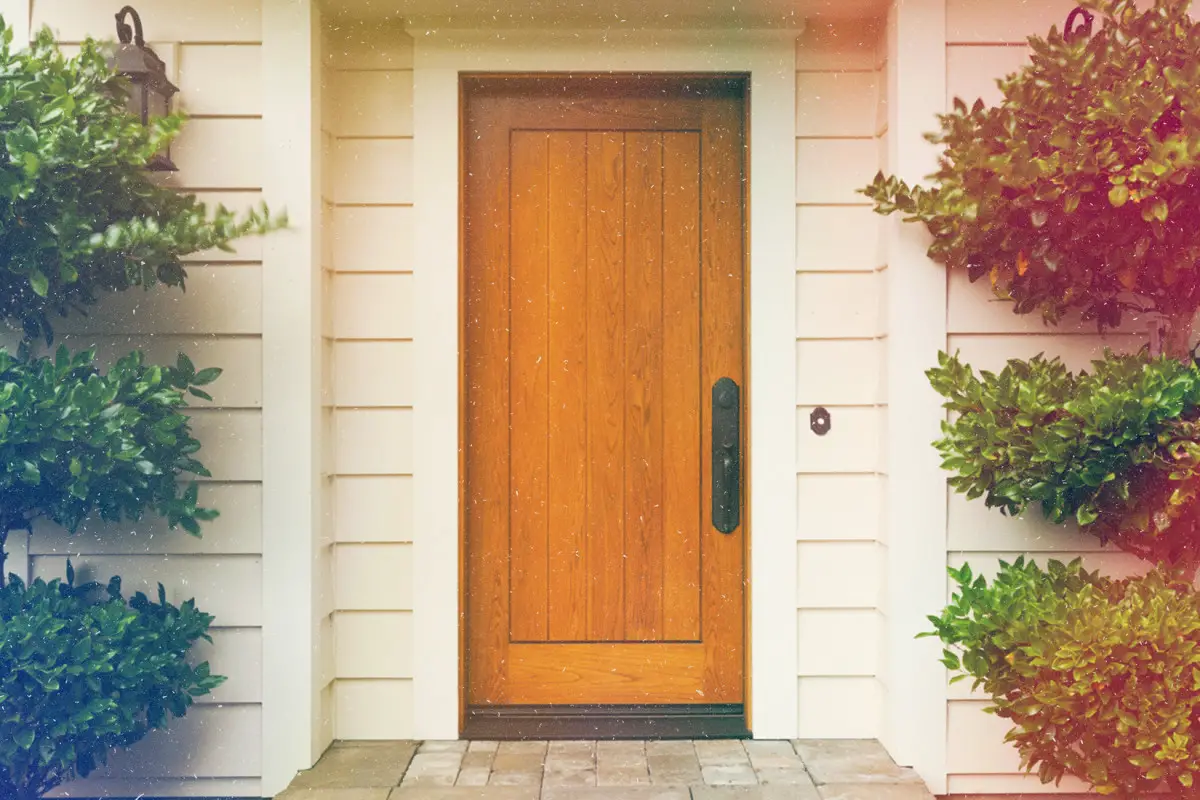
Childhood home dreams often involve fond memories of family, friends, and places from childhood. Common themes include exploring a childhood home, returning to a childhood home, playing with family and friends, and revisiting childhood memories. These dreams often signify a desire to go back to a simpler, more innocent time before adult responsibility and stress.
Exploring a childhood home is a popular theme in childhood home dreams. These dreams often involve exploring a childhood home, even if it is no longer there or has been significantly changed. Exploring a childhood home may signify a longing to find a safe place where one can relax and feel comforted.
Returning to a childhood home is another common childhood home dream. These dreams often involve returning to a childhood home and finding it unchanged. This dream may signify a desire to return to a time and place where one felt secure and loved, or to find a sense of acceptance or belonging.
Playing with family and friends is a recurring theme in childhood home dreams. These dreams often involve playing with family, friends, and pets from childhood. These dreams may signify a longing for the simple joys of childhood, such as spending time with family or playing with friends.
Revisiting childhood memories is a common theme in childhood home dreams. These dreams often involve reliving childhood memories, such as playing a childhood game or visiting a childhood favorite spot. These dreams may signify a desire to reconnect with a simpler, more carefree time before adult responsibility and stress.
Reconnecting with the Past

For many people, the concept of a childhood home dream is a powerful one. It is a chance to reconnect with a past that may have been forgotten, to rediscover the joys of childhood and to share them with family and friends. It is a chance to relive the memories of a time that was simpler, when life was less chaotic and more carefree.
| Pros | Cons |
|---|---|
| Re-experience childhood memories | Cost of renovations |
| Create a sense of nostalgia | Time consuming |
| Share memories with family and friends | Uncertainty of outcome |
| Rediscover the joys of childhood | Financial burden |
For some, this dream may be too daunting to attempt. The cost of renovations and the time and effort it would take to complete the project could be too much for some to consider. There is also the chance that the outcome may not be what was envisioned, adding to the uncertainty of the undertaking.
However, for those who are willing to take the risk, the reward of reconnecting with the past can be incredibly rewarding. The memories and emotions that come with it can be priceless, and the chance to share those memories with family and friends is a gift that can be cherished for a lifetime.
Examining Unresolved Issues
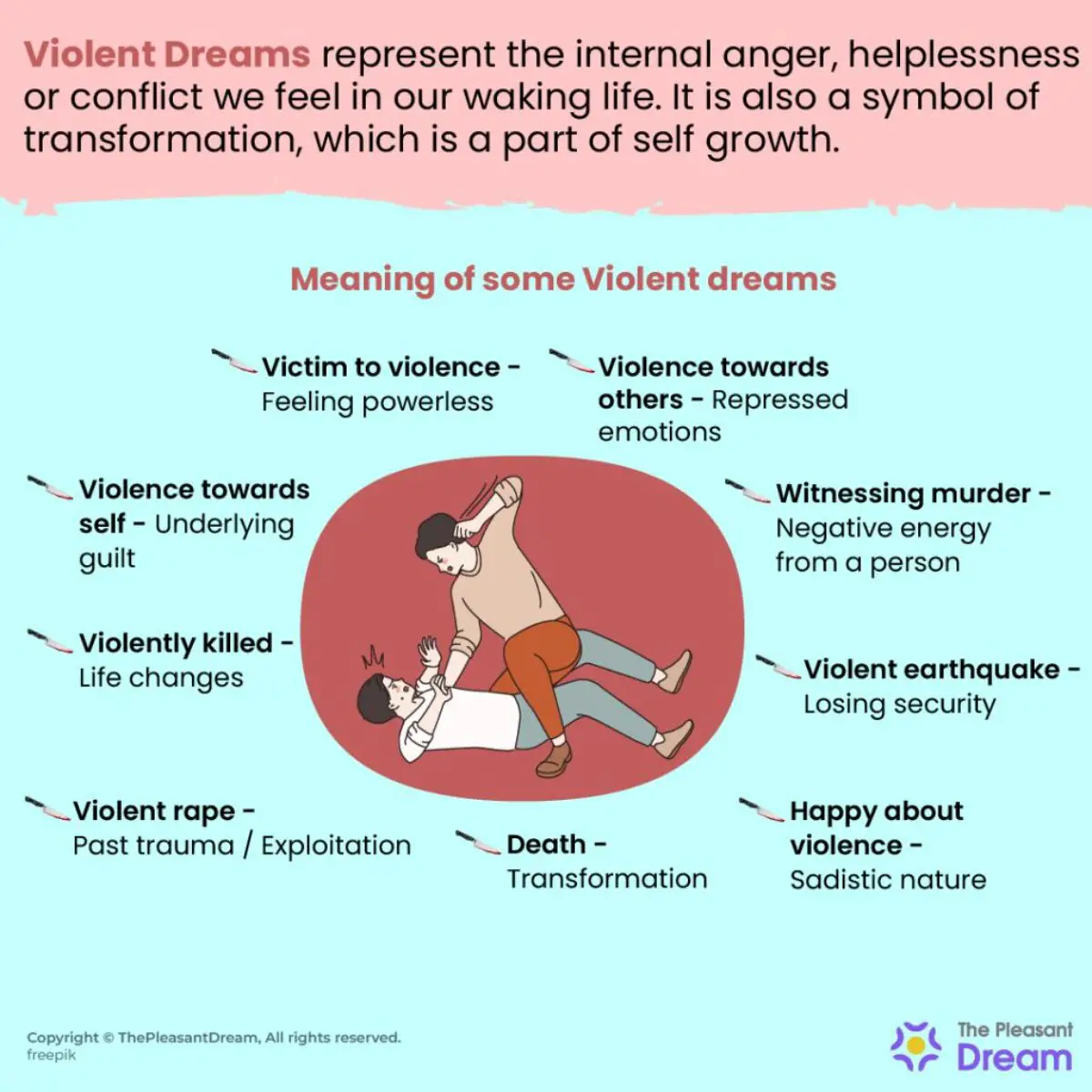
| Issues | Implications |
|---|---|
| Economic Disparities | Income disparities between rural and urban areas can prevent access to basic necessities like safe housing. |
| Accessibility | Location of the childhood home may affect accessibility to education, healthcare, and employment opportunities. |
| Cultural Appropriation | Urban development may lead to the displacement of historically marginalized communities. |
| Housing Insecurity | Inadequate housing can cause physical, emotional, and financial strain on families. |
| Opportunity Disparities | Poor access to higher education, jobs, and resources can lead to an unequal distribution of opportunity. |
Certain unresolved issues can impede the realization of the childhood home dream. Economic disparities between rural and urban areas can prevent access to basic necessities like safe housing. Location of the childhood home may affect accessibility to education, healthcare, and employment opportunities. Urban development may lead to the displacement of historically marginalized communities. Inadequate housing can cause physical, emotional, and financial strain on families. Poor access to higher education, jobs, and resources can lead to an unequal distribution of opportunity.
Searching for Comfort

| Physical Comfort | Emotional Comfort |
|---|---|
| One of the most common childhood home dreams is that of finding comfort, both physical and emotional. Physical comfort generally refers to a feeling of safety, security, and warmth. This can often be expressed through memories of a comfortable bed, cozy blankets, and a place where one can be free of worry and stress. | Emotional comfort is harder to define, but is often associated with a feeling of being accepted and understood. This can often be expressed in childhood home dreams as a sense of feeling accepted and loved for who one is and a sense of belonging. It can also come from feeling safe and secure in a home that provides emotional support and stability. |
Finding a childhood home can be a powerful source of comfort, both physical and emotional. It can provide a sense of safety and security, and a place to relax and be free of worry and stress. It can also be a place where one feels accepted and loved for who one is, and where one can feel a sense of belonging. Finding a childhood home can be a powerful source of comfort and a reminder that one is not alone.
How to Interpret a Childhood Home Dream
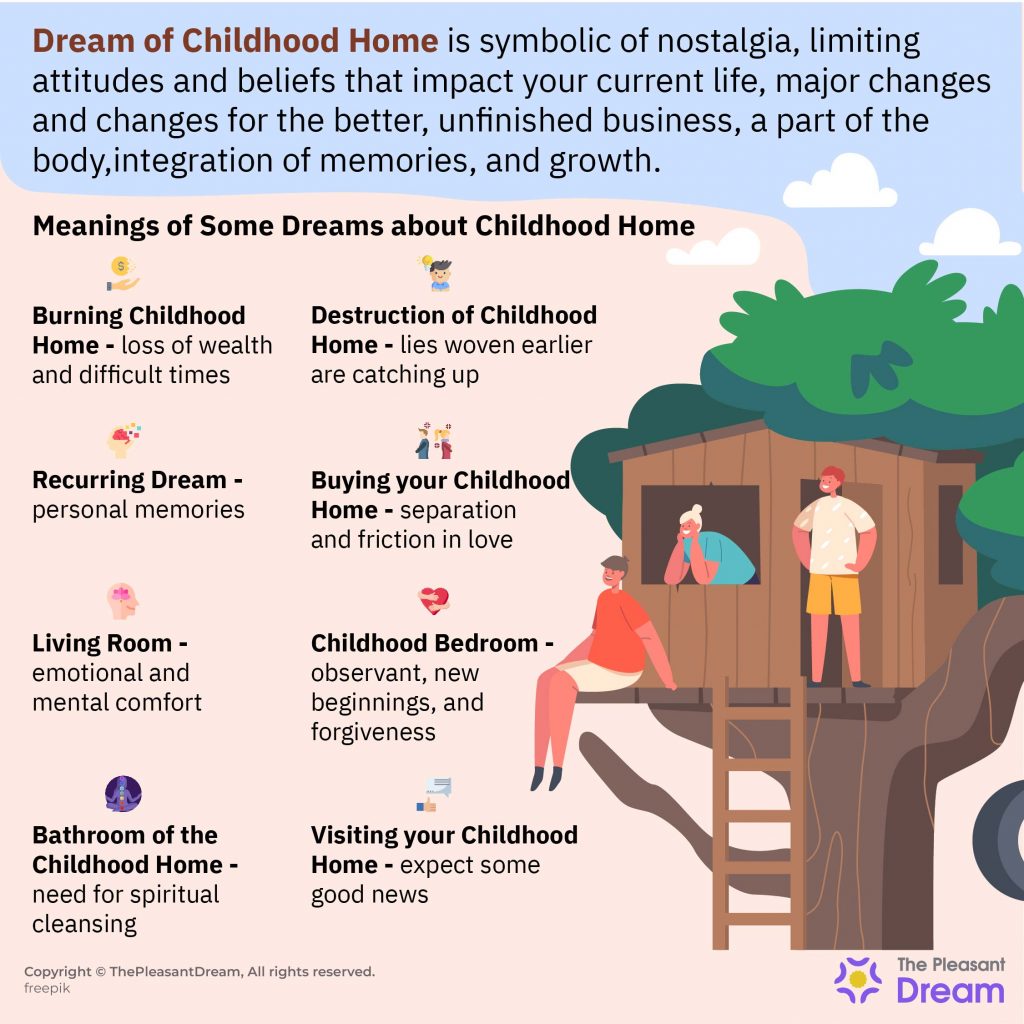
| Step | Description |
|---|---|
| 1 | Identify the setting of the dream. Note what elements you remember and what emotions arise. Do you remember being alone or with others? Is the home the same as when you were a child or different? |
| 2 | Think about what the dream may symbolize. Dreams of childhood homes often represent a longing for safety and security. They can also symbolize nostalgia and the desire to return to a simpler time. |
| 3 | Consider what has changed in your life since childhood. Are there situations or relationships that you are struggling with? Are there unresolved issues from the past? Think about how the dream may be related to these changes. |
| 4 | Analyze your feelings in the dream. Do you feel happy, sad, scared, or some other emotion? Think about what this emotion might mean in terms of your current life situation. |
| 5 | Think about how the dream might be an opportunity for you to make positive changes in your life. For example, if you feel scared in the dream, you may need to take steps to feel more secure or to address unresolved issues. |
Working with the Dream

- Understand what the dream is about, and what it means to you.
- Research the area where the childhood home is located.
- Identify the resources available to you, such as local government agencies, charities, and support groups.
- Explore the possibility of buying a home in the area.
- Create a budget for any renovations that may need to be done.
- Set aside money for legal fees.
- Contact real estate agents for information about local properties.
- Settle on a realistic timeline for realizing the dream.
- Start a savings plan to help you reach your goal.
- Enlist the help of family and friends in making your dream come true.
How to Work with the Dream
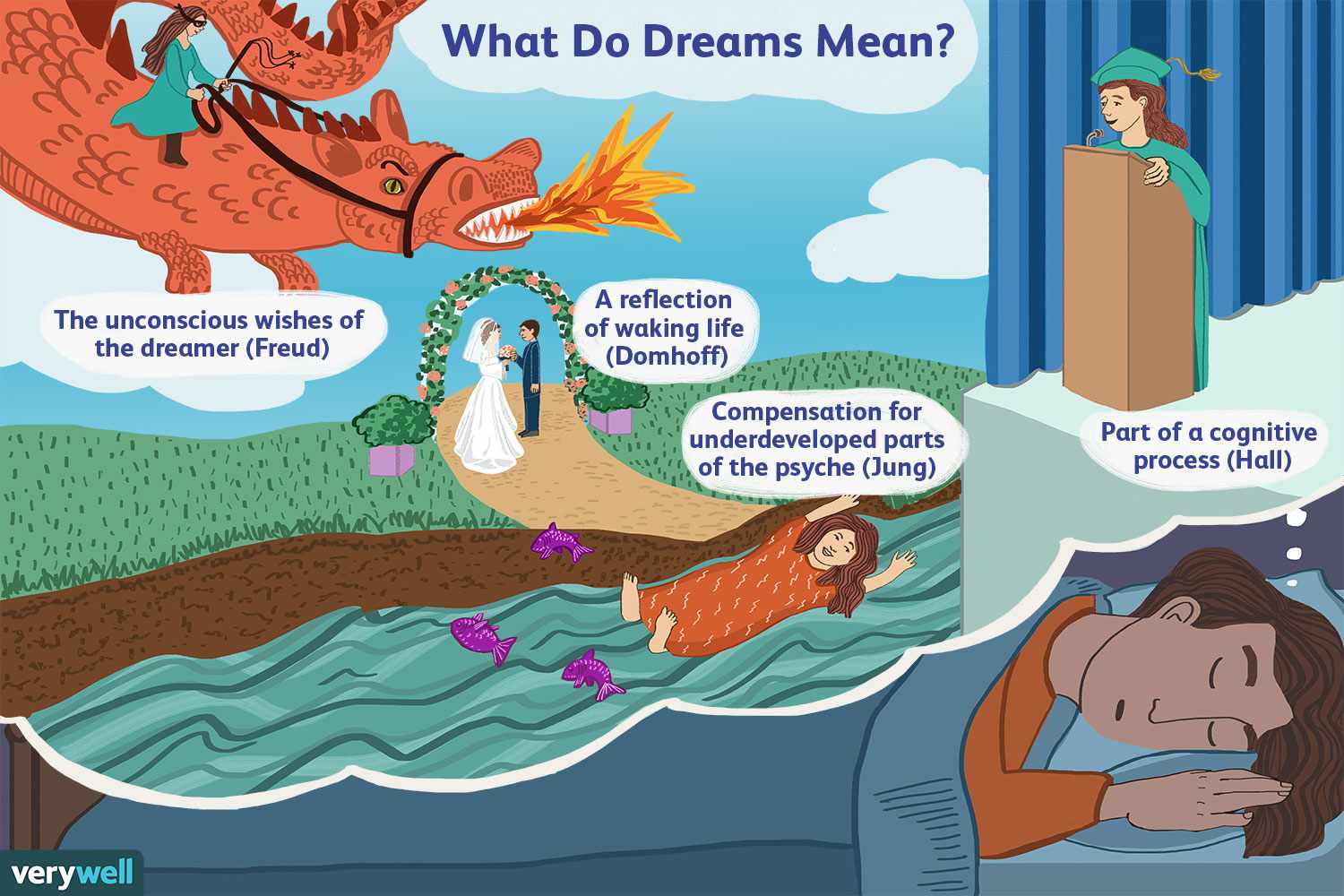
Identify the dream. Take a few moments to sit in stillness and connect with the dream. Feel what the dream is communicating to you. Ask yourself questions such as: What is the dream trying to tell me? What do I need to learn from this dream? Is there a message I need to take away?
Acknowledge the dream. Acknowledge the dream and the feeling associated with it. Give yourself time and space to process it, and even write it down or draw it out.
Explore the dream. Allow yourself to explore the dream and its meaning. Look for symbols or images that may be hidden in the dream. Is there a person or animal that stands out? Can you identify any feelings in the dream?
Look for a deeper meaning. Dig deeper into the dream to find a deeper meaning. Is there a message or lesson you can take away from the dream? How can you apply this lesson to your life?
Take action. Once you have identified and explored the dream, take action. Make a plan for how you can use the dream to move forward in life. Put your plan into action and monitor your progress.
Release the dream. Once you have taken action and worked with the dream, it’s time to release it. Let go of the dream and any emotions associated with it. You may wish to write it down, burn it, or simply release it in meditation or prayer.
How to Work with Fearful Dreams
| Step | Description |
|---|---|
| 1 | When a fearful dream arises, pay attention to the feelings and sensations you are experiencing in the dream. |
| 2 | Take a few moments to observe and note the details of the dream. Write them down if possible. |
| 3 | Once you have identified the fear, spend some time reflecting on what it is that you are afraid of. |
| 4 | Ask yourself what you can do in the dream to reduce your fear. This could include walking away, talking to someone, or confronting the fear. |
| 5 | Once you have taken the steps to reduce your fear, take a few moments to reflect on your experience and how it could help you in real life. |
When to Seek Professional Help
- If the dream is accompanied by strong physical reactions such as sweating, trembling, or heart palpitations.
- If the dream triggers intense fear or distress.
- If the dream feels overwhelming or out of control.
- If the dream is recurring and does not decrease in intensity.
- If the dream is causing difficulty sleeping or other severe interference with daily life.
Frequently Asked Questions
What does it mean to dream about your childhood home?
Dreaming about one’s childhood home can have a variety of meanings, depending on the context and the details of the dream. Generally, these dreams can be a symbol of nostalgia, a reminder of past traumas, or a sign of comfort and security. The dream may also be a reflection of past experiences and serve as a reminder of the need to explore and process these experiences. Alternatively, the dream may be a sign of a need for stability and security in the present.
Why do I always dream of my childhood home?
Dreams of childhood homes are often a reflection of feelings of nostalgia and longing for a simpler time. These dreams may represent a desire to return to a simpler, more carefree life, or they may represent a need to resolve unresolved issues from the past. They may also be a sign of insecurity or anxiety about the present. Childhood home dreams may also indicate that the dreamer is seeking a sense of security, safety, and peace.
Why do I keep dreaming about my childhood home?
Dreams about childhood homes can be a way of trying to connect with something that was once familiar and comforting. It could be a sign of nostalgia and a longing for the past. Dreams of childhood homes can also signify a desire for security, safety, and a sense of belonging. They can also be a sign of unresolved trauma or unresolved issues that need to be addressed. In some cases, dreams of childhood homes reflect a desire for a simpler, happier time. It could also be a sign of a need for emotional healing.
What does it signify when I dream about my childhood home?
Dreaming about one’s childhood home can be a sign of nostalgia, comfort, and security. It can be a reminder of the past and of happy memories. It can also suggest a longing for the safety and structure offered by childhood. Alternatively, it may represent a desire to return to a simpler and more familiar time. Dreams of one’s childhood home can also symbolize a need for spiritual healing and growth.
Why do my dreams take place in my childhood house?
Dreams are a reflection of our innermost thoughts and feelings, and often the place of our childhood home can feature in them. This is because childhood is a significant part of our life, and our memories from this time are often the most vivid. Dreams allow us to relive these memories, and the familiarity of our childhood home can evoke strong emotions. Dreams about our childhood home may also be an attempt to relive moments of joy and comfort. Alternatively, they may be a way of processing unresolved issues from our childhood.
Conclusion
Dreams about childhood homes can be highly symbolic and help us to understand our emotions and relationships. Often, the dream is a reflection of our present state of mind and the unresolved issues from our past. By exploring the dream and identifying the symbols, we can gain greater insight into our current life. Additionally, looking at the dream from a spiritual perspective can provide valuable insight into our spiritual journey and life’s purpose.








